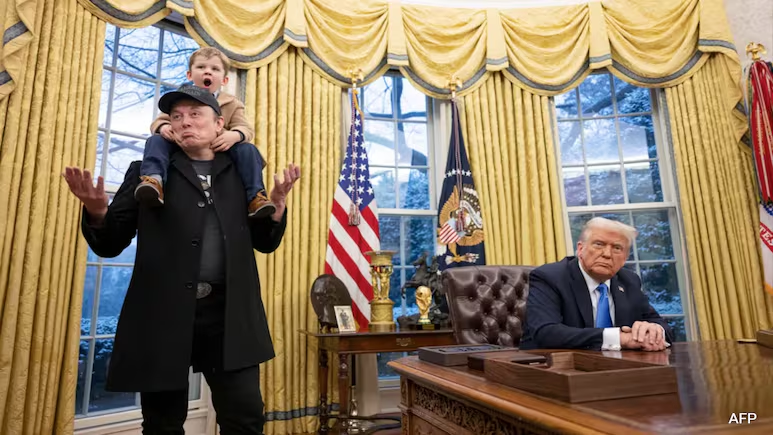As the world watched Donald Trump’s inauguration as the 47th president of the United States, the presence of some of the world’s wealthiest individuals at the event was striking. Some of the tech billionaires that were notably present included Elon Musk, CEO of SpaceX and Tesla, with a net worth of $423.8 B, Jeff Bezos, CEO of Amazon, with a net worth of $250.9 B, and Mark Zuckerberg, the CEO of Meta, with a net worth of $239.2 B. Their presence, along with donations and praise from other prominent industry leaders such as Shou Chew, CEO of TikTok, Tim Cook, CEO of Apple, and Sam Altman, CEO of OpenAI, point to the increasingly close ties between the Trump administration and the wealthiest elites in American society. The dangers of this relationship were brought to the attention of the American population during former President Biden’s farewell address, where he stated, “[T]oday, an oligarchy is taking shape in America of extreme wealth, power, and influence that literally threatens our entire democracy, our basic rights and freedom, and a fair shot for everyone to get ahead.” An oligarchy denotes a government system in which a small group of, typically very wealthy individuals, make decisions for all the people. A study conducted at Princeton University over a decade ago deemed that corporations and economic elites significantly influence governmental decision-making, whereas the average citizen has little power. This serious power imbalance has only worsened, reflecting wealth imbalance, with the top 1% holding 43% of global wealth.
Trump’s political campaign success can be attributed to his use of populist rhetoric, with the promise to lower average Americans’ living costs. While it may be premature to assess the full impact of Trump’s enacted and planned policies, early indicators suggest that measures of tariffs, tax cuts, and the repealing of Medicare harm lower-income Americans, while benefiting the top 1%. Therefore, it is easy to see how Biden’s claim of forming an oligarchy may have merit.
…Trump’s enacted and planned policies, early indicators suggest that measures of tariffs, tax cuts, and the repealing of Medicare harm lower-income Americans, while benefiting the top 1%.
Elon Musk has been one of the most influential individuals in Trump’s campaign. By donating nearly $300 million and using X, Musk’s social media platform, to facilitate his campaign messages, Musk has demonstrated overwhelming support. These moves paid off, helping Trump win the election and earning Musk the position of head of the newly formed Department of Government Efficiency (DOGE), a team that aims to cut federal government spending. Now responsible for major governmental reorganization, Musk earned this job without political experience, further marking the oligarchic tendencies of American democracy, with political power becoming more concentrated among the wealthiest individuals. The concentration of power among billionaires and business leaders, like Musk, can lead to policies favouring the elite, potentially at the expense of the broader population.
In a world with worsening wealth inequality, the presence of billionaires in politics serves as a stark reminder of the potential dangers of concentrated wealth and power in government.
Oligarchies involve the prioritization of the interests of the wealthy elite over the general public’s, resulting in policies allowing the oligarchs to sustain their influence and power to push their agendas. Consequently, democratic institutions are undermined.
Elon Musk’s significant political presence and influence exemplify these concerns. Musk’s lack of political experience, combined with his considerable financial contributions, raises concerns about potential conflicts of interest and undue influence in shaping public policy. Musk and DOGE have already made substantial cuts in funding for diversity, equity, and inclusion (DEI) programs and USAID, the United States Agency for International Development, which provides vital humanitarian aid abroad. This shift in funding priorities could have far-reaching consequences for marginalized communities both domestically and internationally.
Additionally, Trump’s recent decision to remove Lina Khan as Federal Trade Commission Chair, aiming to replace her with a Republican who will likely be more forgiving to companies violating antitrust laws, may further place money in the hands of monopolists. This will likely lead to a lack of competition, higher consumer prices, and decreased innovation. Even seemingly small policy decisions, whether in budget reallocation or regulatory appointments, can have cumulative effects, hurting the public while uplifting the elite few.
As these billionaires accumulate wealth and political power, their influence must be scrutinized, and governing bodies must not allow their actions to go unchecked. The officials elected by the people must uphold America’s democratic principles and serve the general public, not a small group of elites. Efforts to form oligarchies can be mitigated through campaign finance reform, limiting how much money an individual can donate, modifying tax policy, and increasing taxes for those in the highest brackets.
The increasing entanglement of wealth and political power in the United States, worsening under the Trump administration, raises urgent concerns over the erosion of democratic integrity. As billionaires and corporations hold more influence over public policy, wealth inequality within America will continue to grow, reflecting a correlation between economic means and political power. Without efforts to prevent oligarchic influence, the future of America’s economy and society may face deepening inequality. Wealth concentration may result in reduced economic mobility, with the elite few continuing to make decisions that only suit their interests. As the next four years of Trump’s term unfold, we must remain alert and responsive to the involvement and influence of corporations and economic elites to ensure the democratic principles upon which America was founded will be upheld.








